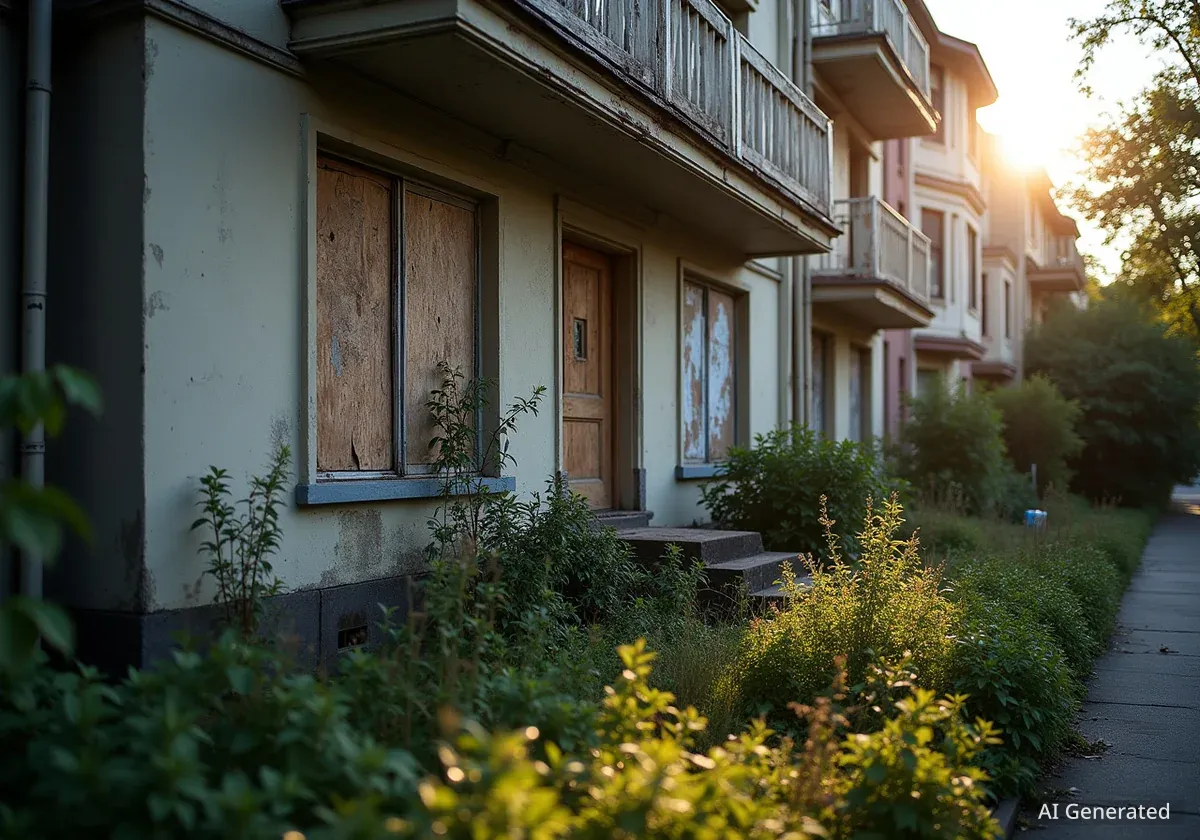A vintage apartment building in Seattle's Queen Anne neighborhood has remained vacant and fenced off for seven years following its sale to an international co-living company. The property, located at 822 Queen Anne Ave. N. and formerly known as Castle Court, was acquired by Node Living with plans to redevelop it into modern housing for young professionals, but the project has yet to move forward.
The prolonged inactivity at this prime location highlights the complexities of urban redevelopment, including navigating city permits, shifting market demands, and the challenges faced by specialized housing models. The project, officially filed in 2020 as "Node Seattle," has left community members and potential residents waiting for progress on the prominent corner lot.
Key Takeaways
- The Castle Court apartment building at 822 Queen Anne Ave. N. has been vacant since it was sold seven years ago.
- International co-living operator Node Living purchased the property to create furnished apartments for professionals.
- Official redevelopment plans were filed with the city in 2020, but construction has not commenced.
- The delay raises questions about the project's future and the viability of the co-living model in a post-pandemic market.
A Prime Location in Limbo
For seven years, a chain-link fence has surrounded the former Castle Court apartments, a property occupying a visible corner in one of Seattle's most desirable residential areas. The building was purchased by Node Living, a company specializing in stylish, community-focused co-living spaces targeted at young professionals and digital nomads. The acquisition was part of the company's broader strategy to expand its footprint in major U.S. cities.
Node Living's business model centers on providing fully furnished apartments with shared amenities and community events, aiming to offer a hassle-free living experience. The Queen Anne location was seen as an ideal spot for this concept, given its proximity to major tech employers and vibrant city life.
The Original Vision for Node Seattle
In 2020, Node Living submitted formal plans to the city for a project it named "Node Seattle." The proposal outlined the development of a multi-story building featuring dozens of compact, efficiently designed residential units. These apartments were intended to be furnished and move-in ready, appealing to a transient professional demographic seeking convenience and social connection.
According to public filings, the proposed development included common areas such as a shared lounge, co-working spaces, and a rooftop terrace. This design is consistent with Node Living's global portfolio, which emphasizes creating a built-in community for its residents.
Understanding the Development Stall
Despite the promising concept and the filing of plans four years ago, the site at 822 Queen Anne Ave. N. remains undeveloped. Several factors common in urban real estate projects could contribute to such a significant delay. These often include navigating a complex and lengthy permitting process, securing financing, and addressing unforeseen site challenges.
The Co-Living Market Shift
The co-living concept gained significant traction in the late 2010s as a solution to rising urban housing costs and a growing desire for community. However, the global pandemic in 2020 presented a major challenge to this model, which is built on shared spaces and social interaction. Many operators had to adapt their strategies or pause expansion plans as remote work and social distancing became the norm.
Market dynamics have also shifted considerably since the project was first envisioned. Changes in housing demand, construction costs, and interest rates can impact the financial viability of a development. The post-pandemic era has seen a recalibration of what people want in a home, with some prioritizing more private space over shared amenities.
The History of Castle Court
Before it became the subject of redevelopment plans, the Castle Court building was a piece of Queen Anne's architectural history. While not a designated landmark, the vintage structure was representative of the neighborhood's classic residential character. Its vacancy represents a pause in the site's long history of providing housing in the community.
Seven Years of Inactivity
The property has been fenced off and unused since Node Living acquired it. This extended period of dormancy is unusual, even for complex development projects, and has led to speculation about the owner's intentions and the project's status.
The sale seven years ago marked a turning point, signaling a shift from traditional apartments to a new, specialized form of housing. However, the lack of progress means the community has lost existing housing units without gaining the promised new ones in a timely manner. This situation is a common point of friction in rapidly growing cities like Seattle.
What's Next for the Queen Anne Site?
The future of 822 Queen Anne Ave. N. remains uncertain. Public records indicate that the development plans filed in 2020 have not been withdrawn, suggesting the project may still be technically active, albeit stalled. Node Living has not released any recent public statements regarding its plans for the Seattle property.
Several outcomes are possible:
- Project Revival: Node Living could move forward with the original plan, perhaps with modifications to reflect current market conditions.
- Property Sale: The company might choose to sell the entitled or unentitled land to another developer who may pursue a different type of project.
- Plan Re-evaluation: A complete redesign could be initiated, potentially shifting away from co-living to traditional apartments or condominiums.
For now, the empty lot serves as a silent reminder of an ambitious project caught in the currents of market change and development hurdles. Residents of Queen Anne and the broader Seattle community continue to watch the site, hopeful for a resolution that will bring new life and housing to the prominent corner.





